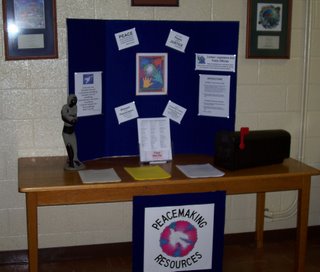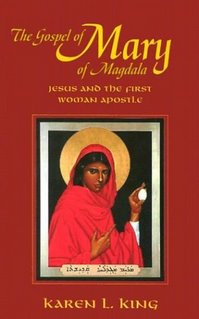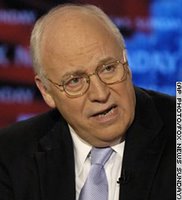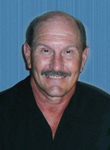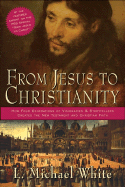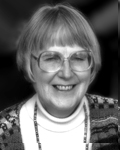Our local paper,
The Johnson City Press, has as its by-line, "Empowering People Through the Press." Presbyterians were empowered over the weekend. Last week, James Brooks of the Press reported on our
peace demonstration on Martin Luther King Day. I sent him an e-mail thanking him for the article. He wrote back that he would like to do an article about me in the Faith section of the paper. Always ready to indulge in shameless self-promotion, I agreed.
Here is that article:
RADICAL REVEREND
Area church leader says views result of personal growth, study, reflection
By JAMES BROOKS Press Staff Writer jbrooks@johnsoncitypress.com
The Rev. John Shuck is that rarest of breeds, a liberal minister in a conservative Christian environment.
“Part of a minister’s job is to offer people permission to grow and explore, and not necessarily end up in some predetermined place,” Shuck said. “Sometimes parishioners will come to me and say they wonder about the issue of virgin birth, and I encourage them to explore the issue.”
That would be heresy in the Catholic Church and in many Protestant congregations, but Shuck isn’t worried.
He followed a similar path growing up in a Southern Baptist home in Montana, and ended up as a Christian minister, after all. He says his views have come about as a result of personal growth, study and reflection.
“As a kid I was bugged by this end of time idea, as well as evolution. It didn’t coincide with what I was learning in science and history classes, and I decided that this religion is not working well,” he said. “I followed my wife into the Presbyterian Church and decided to go into the ministry.”
Presbyterians have a long history of social activism. During the early 19th century they were actively involved in the anti-slavery movement and the underground railroad. However, such activism stems from the will of individual congregations rather than doctrine coming from above.
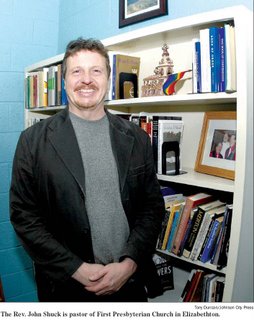
He graduated from the Princeton Seminary in 1992, and his view was heavily influenced by two authors. Marcus Borg wrote “Meeting Jesus for the First Time, Again,” and John Dominic Crossan wrote “Jesus, a Revolutionary Biography.”
“The picture I came out with of the historic Jesus was of a man who was informed about the poor, social justice and one who said we will discover the Kingdom of God within ourselves,” he said.
As a rule Methodists and Presbyterians represent the middle of the road among Protestant congregations, more distinct due to their methods of church governance than by theological considerations. Shuck loves theology. He believes it is what the ministry is about, and he has a Web site (shuckandjive.blogspot.com) where he posts extensive writings on every aspect of theology and invites readers to respond.
His method is closer to the Symposium of Plato than the Council of Nicea. Like all blog sites, it is a work in progress. Currently, there are six Es under the heading of Context: Ecology, Energy, Economy, Entitlement, Exceptionalism and Empire.
In the course of time other Es, such as Ethics, Earth or Extremism are likely to be developed.
Also on the site is news of anti-war demonstrations and other community events of interest.
Shuck’s philosophical and actual path has taken some twists and turns. His first congregation was in a small town in upstate New York near the Canadian border. After eight years he answered the call to a larger congregation in Billings, Mont., his home state, where he found a congregation of 500 members with what he describes as “a lot of theological differences.”
“I took a position of open acceptance of gays and lesbians,” he said. “It was a learning experience. I began looking for a different congregation and decided to let them know up front where I am coming from. Of all the congregations, Elizabethton rose right to the top.”
He discovered he was following John Martin, pastor at First Presbyterian for 33 years with a long tradition of talking and acting on social justice.
“Every church has its resume and my criteria included a church that accepts anyone,” Shuck said. He felt right at home with this congregation of 250 members, which includes several scientists.
“I like to write and share ideas,” Shuck said of the Web site. A current posting invites readers to explore the other books and epistles that didn’t make it into the Bible. “This is an important new area into the study of Christian origins,” he said. “When the Council of Nicea met and decided which writings should make up the New Testament it was only after centuries of discussion. We have to recognize that the authors of these other books were also Christians, and what they said and wrote had an impact into the molding of our faith.”
He is using the text from the Gospel of Philip as a sermon text. “Our services are structured, as in any other church. We do have a period of silent meditation, but our discussions are centered around our classes. The theme is to present an idea for discussion and exploration, not to say here’s what you have to believe.”
First Presbyterian Church in Elizabethton is located at 119 W. F St.
My wife, after teasing me about the article, said that she is going to get me tights, a cape, and embroider a huge RR on my chest.
Then on Sunday, Doug Janz of the Press did a story on Hybrid cars.
Rise of the Hybrid: These fuel-efficient friendly cars are soaring in popularity thanks primarily to those who drive them. Hybrid owners are so passionate about their vehicles that they’ve become the most successful salespeople carmakers could have.
story by Doug Janz

Few car owners are more passionate about their ride than owners of hybrid cars. Just ask them. If you’re in a parking lot or at the gas pump and notice someone with a hybrid, and you make a vague inquiry, you’re likely to get an enthusiastic response. These owners tend to become de facto salespeople for their cars. They are ambassadors-at-large for the cause. “Come, join us,” they seem to be saying. “Come see the light.” “My husband, Gary, is a good salesman for the car,” Toyota Prius owner Nancy Barriger said. “He’ll stop and tell anyone about it.” “It does make a big statement,” said Sandra Garrett. She and her husband, John Dewey, live in Stoney Creek and own a Prius. “It’s almost a badge of honor, and you get this sense of community with other hybrid owners.” Why are owners of hybrids — high-tech cars powered by both gasoline and electricity — so passionate about their vehicles? Perhaps because the cars represent something more than just driving around in style, more than looking good or being comfortable or going fast.

(Rebecca Nunley and Richard Brosmore own two Priuses)
“It’s bigger than just a car,” Unicoi’s Rebecca Nunley said. Nunley and her husband, Richard Brosmore, own two Priuses. “It’s personal for me — really, it’s spiritual for me. It’s important to the way I live my life, considering the issues of overconsumption and conservation.”
Hybrid cars can represent a lifestyle and its priorities. They get extremely good gas mileage (as much as 60 mpg in some models) and do so with greatly reduced emissions (Prius reduces emissions by 90 percent), thus they are environmentally friendly. Buying a hybrid is one of the biggest “green” commitments someone can make.
By now, most people have seen hybrids on the road. The earliest versions were decidedly different from conventional automobiles, sometimes looking space-agey and experimental. They are becoming more commonplace, as well as more stylish, more practical, better-performing and not so klunky, although hybrids still represent only a tiny fraction of cars on the road.
The king of hybrids is the Prius, by far the most popular such car in the United States. The rest of the automaking industry lags behind Toyota in both technology and production of hybrids.
Toyota, in fact, plans to evenually offer 75 percent of its models in a hybrid version. Already, there are hybrid Highlanders (an SUV), Camrys and other models that have almost no noticeable differences in appearance, on the outside, from their conventional gasoline-engine models. Honda makes the Civic and Accord. Lexus, Saturn and Ford, among others, also make hybrid models.
Who buys these cars?
“Traditionally what we’ve found is most hybrid buyers are very well-educated before they get here,” said Dan Leighton, sales manager for Phil Bachman Toyota in Johnson City. “They’ve done a lot of research, and sometimes they know as much as we do about the car.
“The buyers used to be people who were engineer types, were really fascinated with the technology, or people who were really environmentally conscious. Now it runs the gamut. We get everybody.”
While there are no statistics on it, the general assumption is that hybrid buyers are more likely to be Democrats than Republicans, liberals than conservatives, white-collar professionals rather than blue-collar. Garrett said that as a Prius owner she notices other such cars on the road right away, and over the years “I’ve only seen one with a Bush sticker.”
But hybrid-car owners also say it shouldn’t be a political choice. Being economical and concerned about the environment are apolitical issues.
“It is putting our money where our values lie,” said Barriger. “It’s a little more expensive for its size than other cars, but not that much more. And I think as people become more aware of the environmental problems the Earth is facing, as it keeps coming out in the mainstream media, they’re realizing we’ve got to make changes.”
Owners of hybrids generally incorporate “green” habits into their daily routine, such as recycling, composting, buying energy-efficient appliances or contributing to environmental groups and projects. Prius owners mentioned other ways they conserve by owning such a vehicle: The car is supposed to last longer than conventional cars, up to 600,000 miles, and uses less gas (45 to 55 mpg) and oil (needs changing about every 7,000 miles rather than every 3,000), they say.
The Barrigers, as well as Nunley and Brosmore, are members of the First Presbyterian Church in Elizabethton. Up to a dozen Priuses can be found in the church parking lot on a Sunday morning, prompting people to jokingly call it “the First Priusbyterian Church,” pastor John Shuck said.
Two of the biggest concerns about hybrids are whether they’ve got enough acceleration for sudden traffic situations, and whether they’re roomy enough to be comfortable.
“I’ve talked to people about these cars,” Garrett said, “and the biggest misconception is they’re not very powerful. But if they believe that, then I just give them the keys and say ‘Try it.’ ”
“It’s peppy,” Brosmore said. “It surprised me. And it’s there when you need it.”
As for comfort, Dewey, at about 6-foot-3, said he has no problems, even on long trips.
Why don’t more people buy hybrids? For one thing, they cost more than conventional vehicles.
A new Prius will cost $22,000 or more. There are temporary tax breaks in effect that can save about $3,000, but even with the savings from good gas mileage, it still may take a while to break even with costs, compared to a conventional car. (One recent study concluded that, over several years, hybrid owners will actually spend $3,000 less in overall operating costs.)
Because hybrids are relatively new and produced in smaller quantities than conventional cars, there are fewer of them available — and fewer used ones — so someone on a tight budget will have a hard time finding a $5,000 hybird. And because of the technology involved, there are fewer mechanics qualified to work on them.
But the benefits far outweigh the setbacks, these owners believe, especially regarding the future of the environment.
“It’s easy for people to say ‘There’s nothing I can do; it’s too big,’ ” Nunley said. “I don’t think global warming’s gonna end because I bought a Prius. But we can all do our part.”
“One thing I’m hoping,” Barriger said, “is that American car manufacturers will realize people are ready for this kind of technology.”
Gary Barrigar is the webmaster for First Presbyterian Church. Nancy Barrigar and Rebecca Nunley get the blame for serving on the Pastor Nominating Committee that brought me to East Tennessee.











